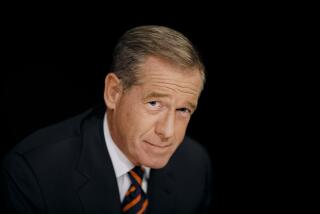Editorial: Brian Williams’ lost credibility harms other serious journalists
- Share via
“NBC Nightly News” anchor Brian Williams got the facts wrong about his flight into the Iraq war zone in 2003, then he got the apology wrong. On Saturday, with more of his public statements — including some about covering Hurricane Katrina — attracting media scrutiny, he stepped aside as anchor temporarily while NBC investigates. His travails are the latest illustration of the perils of celebrity journalism, in which the story takes a back seat to the person telling it. Williams’ stature as the country’s most-watched journalist means that his plunge in believability harms not only himself, but potentially all serious journalists who rely on the trust of their audiences.
Williams’ troubles began the year before he became the face of NBC News’ flagship program, when he traveled to Iraq to provide some in-person coverage of the newly launched invasion. The fact that the network sent Williams, then an anchor on CNBC and MSNBC, instead of an experienced war correspondent reflects the lamentable but common practice of chasing ratings by framing news readers as star journalists.
As Time magazine columnist James Poniewozik noted, Williams’ initial account of the Iraq incident amped up the drama, the sort of tonal enhancement that’s proliferating as the competition among news outlets intensifies. His experience flying into Iraq on the same night some helicopters came under fire became the story, rather than the war being fought by actual military personnel. Over time, the dramatization morphed into an outright fabrication: Williams’ claim that his helicopter was hit by a rocket-propelled grenade.
Williams is hardly the first famous person or journalist to aggrandize his role in important events. But as a journalist, he should have valued his integrity over his image. And even if he didn’t, he should have known that social media would inevitably note the differences between his narrative and reality. NBC News’ own Facebook account helped draw eyewitnesses out of the woodwork to say Williams wasn’t in or anywhere close to the helicopter that was forced down. That blowback led Williams to apologize on air Wednesday, but he made matters worse by continuing to suggest he’d been in grave danger.
The Internet gives the public a wide range of information sources, and people have an alarming tendency to gravitate to the ones that reinforce their views. Mainstream outlets such as NBC News are counting on the credibility they’ve gained over years of reporting to lift them above the bellowing crowds online. That credibility is something that Williams should have taken more care to protect.
Follow the Opinion section on Twitter @latimesopinion and Facebook
More to Read
A cure for the common opinion
Get thought-provoking perspectives with our weekly newsletter.
You may occasionally receive promotional content from the Los Angeles Times.









